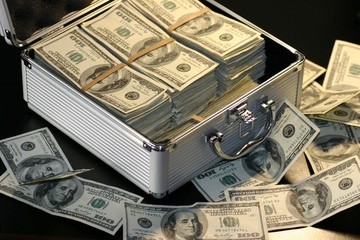US Government Plans to Release Special Funding Amid COVID-19 Spread, Including Checks to Citizens

On Tuesday, the authorities of the United States of America had increased the volumes of testing for the coronavirus of the COVID-19 to prevent its fast spread, says an article.
Check these out:
'Shelter-In-Place': New Yorkers Urged To Prepare For A Stricter Lockdown
17-Year Old Develops Website That Allows You to Track COVID-19 Cases in Real-Time
How to Find Out if You are Positive for the Novel Coronavirus
The devastating effect of the coronavirus epidemic had not skipped the US stock market. The catastrophe had caused a failure for many markets. Swings in prices had become a common area in the stock market in the past days since the coronavirus pandemic had worsened.
The US Stock Market According to the Indices
US stock market indices had been showing rapid jumps in the past days due to the COVID-19 pandemic.
The Dow Jones industrial average had jumped by 1,048 points or approximately 5.2 percent. On Tuesday, it settled at 21,237.
The Standard & Poor's 500 indexes had risen to more or less 6 percent. The Nasdaq composite gained approximately 6.2 percent. The results came after the United States government and the Federal Reserve carried out plans to address the consequences of the spread of the COVID-19 to US citizens. The plan was reported to be a $1 trillion stimulus to a $10 billion credit infusion. This was a pledge to assist the struggling Boeing.
The Volatility of the US Stock Market
According to the President of the investment management firm Farr, Miller & Washington Michael Farr said the volatility of the US stock market reveals the desperate moves of Wall Street to locate fair value. Every statistics and news updates contain 1,000-point swings.
Launching a Special Fund
One solution to the problem came on Tuesday when the Fed released announcements of their plans to launch a special fund. The fund will help keep the credit flowing during the COVID-19 crisis. This had given the Dow a 1,100-point lift. However, the blue-chip index loses half of its gains by midafternoon.
Beginning Tuesday, the central bank will purchase a substantial amount of commercial paper, short-term loans where a multitude of businesses are relying on to fund their bills and other expenses.
The Fed did similar activities during the Great Recession. It had ended up purchasing at least $350 billion of loans or 20% of this market.
Plans for Giving Direct Cash Payments to Americans
The White House is in the process of thinking about issuing direct cash payment to Americans, says Treasury Secretary Steven Mnuchin. The payment is part of the $850 billion stimulus package. The administration hoped this move will control or halt the free fall of the US economy due to the COVID-19 pandemic.
Initially, President Trump gave support to a payroll tax holiday. However, on Tuesday he said that it will take a longer time to give relief to US citizens.
According to Mnuchin, the administration is already planning to give checks to US citizens. He said that the fund could be released in the following 2 weeks.
The news had been received as a break for US markets. US markets had been crazily moving between positive and negative results. These haven't been seen since the 1987 Black Monday crash.
Subscribe to Latin Post!
Sign up for our free newsletter for the Latest coverage!

















